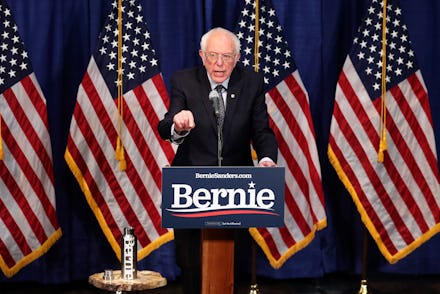Bernie Sanders has changed what it means to be a Democrat

Bernie Sanders experienced a devastating blow to his White House chances Tuesday night when Joe Biden won a majority of the states up for grabs, including Michigan — a state Sanders won in an upset victory in 2016. For all intents and purposes, the night’s outcome represents the end of Sanders’s viability as a candidate. It does not, however, mean the end of his mission.
Over the years since his 2016 candidacy vaulted him into becoming a national figure, Sanders has aggressively pushed the Democratic Party to the left. The Vermont senator’s platform has become part of the de rigeur conversation — consider how every candidate had to take a position on his signature issue, Medicare-for-All, and debates about it consumed much of the primary. Before Sanders, the policy would have been a fringe position; now, it’s directly at the center of the American political conversation.
Compounding the effect, Sanders has played an instrumental role in sweeping a new generation of popular progressive voices who share his views into the national landscape. In 2016, he was a lonely voice in the wild on Medicare for All. Now, he’s backed by nationally elected representatives like Alexandria Ocasio-Cortez, Ilhan Omar, Pramila Jayapal, and Ro Khanna. Massachusetts Sen. Elizabeth Warren, who also advocated for Medicare-for-All, was a fellow frontrunner for much of the race. Candidates like Biden will no longer be able to freely brag about how many people their health care plans would insure — they must also contend with the crucial inverse. As in: How many people would their plans leave uninsured?
Sanders has catalyzed a latent strain of dissatisfaction with the status quo that had been bubbling beneath the surface of the party.
None of this would have happened without Sanders carrying the progressive mantle and shifting the Overton Window for the Democratic Party far to the left. He will almost certainly never be president, but if and when he returns to the Senate after this presidential race is over, he will do so as arguably the most ideologically influential living person in America — possibly second only to Donald Trump, who like Sanders altered the fundamental characters of his political party single-handedly.
The numbers back up the notion of a Sanders effect when it comes to policy. The hospital Kaiser Permanente has been tracking public support for a national government-run health care plan for decades. Support in the 1990s and early 2000s hung around 40%, only reaching a majority in 2016 when Sanders ran for office.
Of course, this isn’t just about one particular 70-something with an old school democratic socialist bent and a charmingly gruff demeanor. Sanders has catalyzed a latent strain of dissatisfaction with the status quo that had been bubbling beneath the surface of the party, especially with younger voters who felt that their concerns were being brushed aside by more corporate-friendly party leaders. These voters and their concerns didn’t materialize out of nowhere. They were always there, but they lacked a compelling figure to coalesce around. Many likely didn’t realize that they weren’t being entirely satisfied by the politicians provided to them by the moderate wing of the Democratic Party until another option emerged.
Health care isn’t the only area where Sanders has radically changed the conversation. He’s also changed the consensus issues like immigration, where data shows the nation has moved dramatically to the left — in 2009, only 14% of people wanted to increase the amount of immigration to the United States, whereas in 2019 that number was up to 30%, per a Gallup poll. That number is almost entirely due to an increase in support for immigration among Democrats. Before 2016, it would have been absurd for a mainstream Democratic politician to suggest abolishing Immigration and Customs Enforcement. Last year, following a wave of activism, Sanders made it part of his official policy, and the previously niche idea has made its way into debate discussions and newspaper analyses.
Sanders has also injected an extreme urgency around the issue of the climate into Democratic primary politics. In a speech Wednesday, the morning after his bruising at the polls, he listed a set of questions that he planned to ask Biden at Sunday’s primary debate, including, “How will you respond to scientists who tell us we have 7-8 years” before climate change does “irreparable harm” to our lives? Sanders’s proposal for a Green New Deal was one of the most aggressive climate plans in the field of 2020 candidates, calling for $16 trillion in spending on everything from reforestation to aggressive implementation of clean fuels. After climate protesters stormed the stage at a Biden rally several weeks ago to demand the legislation be implemented, Biden quipped, “the Bernie bros are here.”
Cementing Sanders’s lasting effect is the massive rise in the influence of left-wing media outlets, including podcasts, websites, and YouTube reporting networks like Chapo Trap House, The Intercept, and The Young Turks. Assuming Joe Biden wins the nomination comfortably, which looks likely after Tuesday’s voting, he (and the moderate wing of the party more broadly) ignores the millions of young voters who have found a collective voice under Sanders’s banner at his peril.